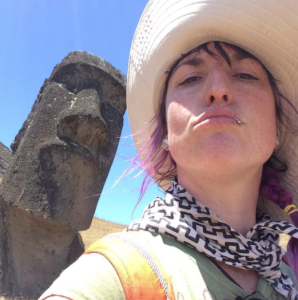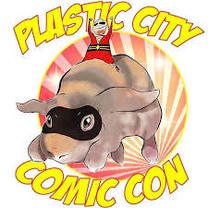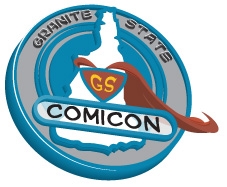“Keeping It Ghastly” is a bi weekly article on Japanese horror comics which have English print editions. Some are from famous authors, others are from unknowns and underground artist circles. In any case, it’s going to be to a terrifying/awesome ride exploring the horror manga on our bookshelves!
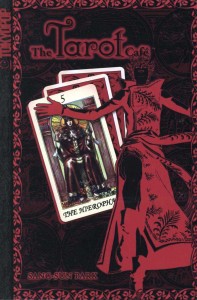
In taking a break from Japanese horror to peruse some of the plentiful Korean horror available in print in English, I came across a series I had long forgotten. Deep in my attic I uncovered a box containing one of Tokyopop’s signature manwha series – The Tarot Cafe. This series of seven books is a magnificently written and rendered story about a Scottish born fortune teller named Pamela. A plucky and fashionable lady, Pamela makes a living in modern England selling tarot card readings at her cafe. During the day she entertains the human world, but at night her clientele shifts to more mysterious patrons. Wish granting cats, vampires, werewolves, alchemists, and many other immortals find their way to her doorstep through one mishap or another. Each carries their own burden, and every one is lost. Pamela, with her knack for accurate readings and her compassionate heart, helps them uncover what it is they are looking for or running from. In return she asks for beads from something called “Berial’s necklace”. Her purpose in this request is a mystery known only to her.

The Tarot Cafe is a supernatural drama with LGBTQ elements from South Korean writer and artist Sang-Sun Park, creator of Ark Angels and artist of Les Bijoux. Each chapter begins with a full page drawing of a tarot card customized for the character or mood of the chapter. Some are better executed than others, but each is still a splendid edition to the eye candy that is Sang-Sun Park’s illustrations. I really can’t say enough about the artwork in this series. There’s a wonderful mix of minimalist tones which really bring the pages to life, especially given the use of stark black and white backgrounds.
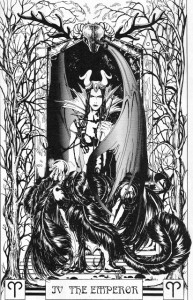
Often times Sang-Sun Park will use tone sheets to create a sort of haze, or softness, just in one small area of the art. Eyes, lips and the slight contours of the face predominantly receive this treatment. It works to accentuate the ethereal beauty of the characters, making the art unique and eye catching.
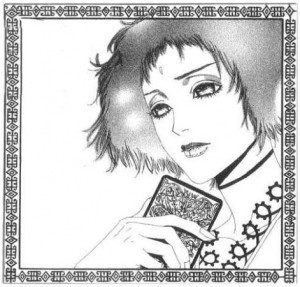
When heavier application of tones is utilized the art becomes even more dramatic, working well with the climax of each chapter.

In terms of story The Tarot Cafe volumes one and two start off pretty standardly with the tried and true monster-of-the-week formula. Characters are introduced, settings are established, and the larger plot behind our protagonists begins to unfold. Stories in the first two volumes can unfortunately suffer from a severe case of melodrama that bleeds into the dialogue and plots. For instance the first volume focuses a lot on the story of a vampire who is looking for the reincarnation of his love, only to tragically make the same mistake that separated them in the first place. The reader is able to see the ending from a mile away. A similar kind of predictable ending befalls a werewolf in another chapter of volume one.
Despite the shortcomings of these beginning episodic stories, there is a consistent rhythm that makes them enjoyable. The continuous connection to fairy tales and the symbolism of the tarot cards gives The Tarot Cafe the same feeling as a Wes Anderson or Laika movie. It’s a story out of time, where semi-mystical things and geography exist right alongside the more mundane world. Apparently unnoticed or at least uncommented upon. This can be disorienting if the reader is not able to suspend their disbelief that such things as alchemists and witch hunters exist at the same time as our normal, everyday London. But once you get your bearings the predictability of the early stories starts to make sense. This is a world where cliches come to be for a reason – fate and magic are the guiding forces, and come with their own logic.
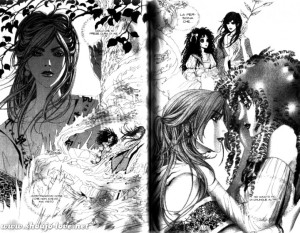
Tokyopop courted North American readers with works by Sang-Sun Park for nearly all of the first decade of the 21st century. During Tokyopop’s life they published all three volumes of Ark Angels from 2005 to 2007, all five volumes of Les Bijoux in 2004 alone, and of course the seven volumes of The Tarot Cafe hit North American bookshelves from 2005 to 2008. After a major company shakeup in 2013 Tokyopop lost the licensing rights to many, many of their titles. Fortunately digital rights to the series were licensed to Comixology. Even now Comixology is where the series and many other titles still licensed by Tokyopop are primarily found. For the die hard print edition lovers like myself Tokyopop print editions of The Tarot Cafe are still readily available on amazon and ebay. Despite having gone on to create more josei horror titles like Gangnam, there has been no news of any other Sang-Sun Park’s other stories being picked up for North American distribution. It’s a sad reality, but there’s always hope that even if her works do not make it into print they will at least become available via digital comics. In short, The Tarot Cafe is one series for LGBTQ friendly YA audiences and gothic shojo fans that you don’t want to miss out on.
Save
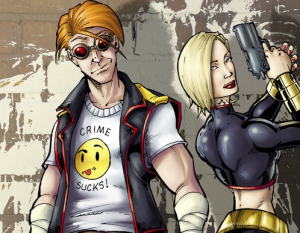







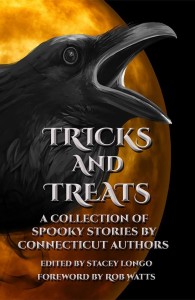
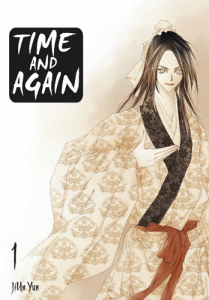
 Our guest tonight is
Our guest tonight is 
 So whenever
So whenever 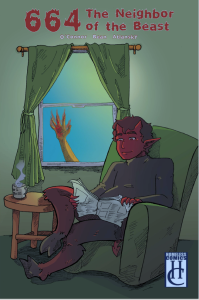
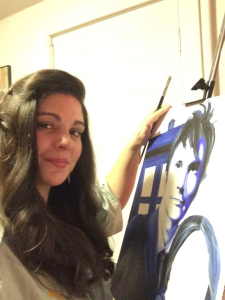 In an inverted format, we begin the show with News:
In an inverted format, we begin the show with News:
